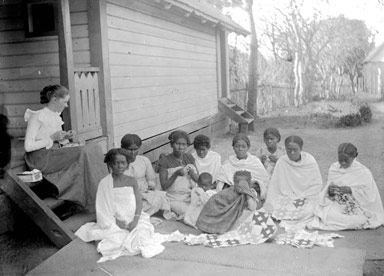The following tidbit is authored by Maura De Chant, Class of 2007. A student worker in the College Archives, Maura is majoring in English and History. I’m sure that Maura would enjoy feedback on her piece. Please email her at: dechantm@stolaf.edu.
“How queer to think that we are getting so near to that big island in the old geography! [We] have land to the left and ahead. The sand banks are so red that it just shines from them. Not this common brownish red, but red pinkish red. And… forests as far as we can see. It is beautiful! Especially now after we have seen all those bare countries and islands along Africa.” [1]
 |
A young Martha Stolee wrote this to her parents in 1901, while she was on her way to Madagascar. Born Martha Josephine Knutson, this extraordinary woman graduated from the St. Olaf Academy in 1896 and then attended St. Olaf College for one year. She married Michael Jacobson Stolee, who graduated from St. Olaf College in 1897. Together, they moved to Paris for a year before beginning their missionary service in Madagascar in 1901.
From 1901-1909, Martha and Michael Stolee worked closely with other American and international missionaries in Madagascar. From her letters, her writings after she returned from Madagascar, and the extensive Stolee Family Photograph Collection recently donated to the Norwegian American Historical Association (NAHA), we are able to piece together a remarkably complete portrait of the life of a female missionary at the turn of the century.
I stumbled across Martha Stolee’s life while researching St. Olaf women at the turn of the century, and I was struck by two things in particular. The first was her youth; Martha Stolee is hardly older than myself in many of the photographs, yet she had already moved halfway across the world. The second was her articulate and energetic letters. As in the excerpt above, Martha Stolee was unfailingly optimistic and excited about her adventure.
While in Madagascar, Martha Stolee had many responsibilities. In the early 20th century, women missionaries were seen as invaluable due to their ability to reach native women. Since women were seen as the major religious influence in a household, the conversion of native women was paramount for western missionaries. The wives of missionaries were able to work more comfortably with the Malagasy women, and in the process taught them western housekeeping skills as portrayed in this photograph.
In addition to working with the native women, Martha’s responsibilities extended to the same duties any Midwestern housewife would have had at that time. Her husband laughingly recalled on day when Martha was sick with fever and he tried to cook himself rice:
It must have taken me a long while to become master of the situation in the kitchen– so long that my wife felt that she had to get down from the upstairs bedroom to see what had happened to me. I can’t see what there was to laugh at– tables, benches, bowls and plates full of half boiled rice, but laugh she did so she laughed the fever out of her system. Since that time I have had respect for the art of cooking.
 |
This scene is striking in its normalcy, in the fact that it could be set anywhere in the United States, but instead it is taking place in Madagascar. However, it illuminates how little expectations changed even when in a missionary setting.
Martha’s time in Madagascar had an enormous impact on her life, and she continued to write about the Madagascar mission long after her return to the United States. In 1938, she and her husband returned for the 50th anniversary of its founding. In her diary, the entry for May 11th, 1938 reads:
It was wonderful to know that we had reached our destination, our Mission Field in Madagascar and that we really were at our dear old Fort Dauphin Home of old. It is impossible to describe the feelings that filled our hearts and souls at this moment.
After over 30 years, Martha Stolee had returned to what she once called “that big island in the old geography”. She had only lived in Madagascar for eight years, but one might say she had finally returned home.
[1] Martha Stolee to Parents, “Declaration Day” 1901. Accession # P1702. Folder 6: “Madagascar Letters 1901,” Box 2. Stolee Family Collection.